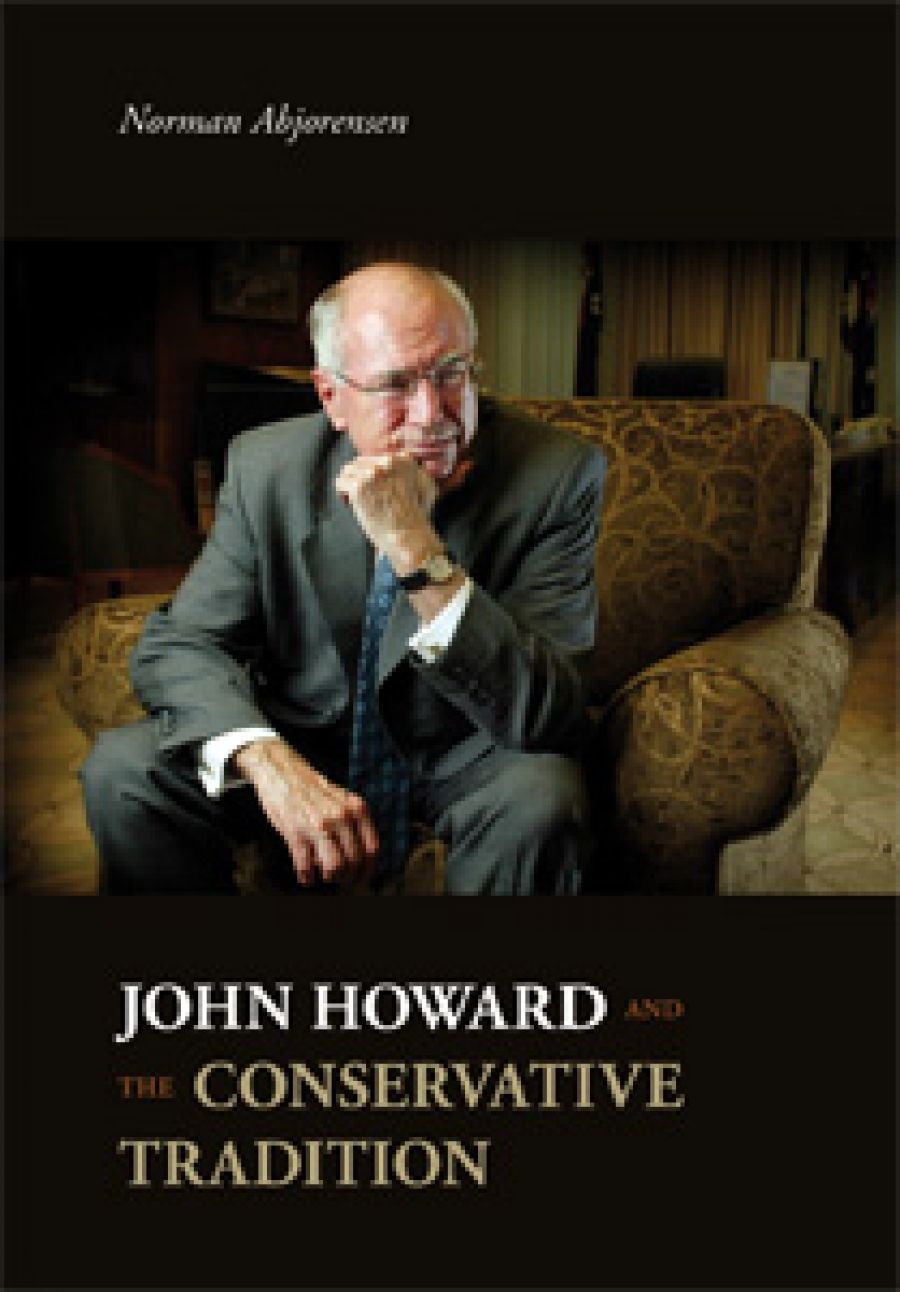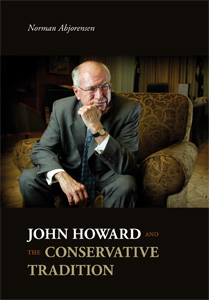
- Free Article: No
- Contents Category: Politics
- Review Article: Yes
- Article Title: Old enemies
- Online Only: No
- Custom Highlight Text:
There has always been a problem with locating conservatism in Australia’s political traditions. As a new settler society dedicated to development, it is hard to see a natural place for a political philosophy that advocates taking things slowly and respecting the wisdom of the past. Nevertheless, the term has been in use as a political label in Australia since the nineteenth century, generally to refer to the defence of privilege and wealth and to the political arrangements that protect them both. It is often used to refer to the Liberal Party and its predecessors, even if at various times these parties have themselves denied the label in favour of the term liberal which stresses the party’s positive commitment to civil and economic liberties and its faith in individual rather than collective and state action. And recently John Howard proudly described himself as a cultural conservative and an economic liberal, as if one could promote radical economic change without also causing cultural and social change.
- Book 1 Title: John Howard and the Conservative Tradition
- Book 1 Biblio: Australian Scholarly Publishing, $39.95 pb, 211 pp, 978921509308
- Book 1 Cover Small (400 x 600):

- Book 1 Cover (800 x 1200):

Norman Abjorensen identifies Australian conservatism with reactive opposition to democratic initiatives, with the defence of capitalism and ruling-class interests, and with cynical ruthlessness when its hold on political power is seriously challenged. Sometimes he distinguishes it from Deakinite social liberalism; other times he sees little between conservatism and liberalism in the Australian political context. This use once had wide currency on the left, but it is an old-fashioned polemical term depending on an unexamined faith in popular democracy and a blind eye to the difficulties of managing an economy that delivers material security to most people. It is no longer possible, it seems to me, to seriously criticise a political position because it is committed to the defence of capitalism, as if there were a realistic alternative, and as if capitalism did not exist in a mixed economy and with high levels of regulation. Yes, there is conflict over the degree and nature of the regulation, but this creates more nuanced political differences than Abjorensen’s idea of conservatism allows.
Instead of calling this book John Howard and the Conservative Tradition, I would have called it John Howard and the Sydney Tradition, because what the book does do very well and very interestingly is to locate Howard in the history of non-Labor in NSW. This year is the centenary of Fusion, the joining together of the NSW Free Traders turned anti-socialist with the Victorian based Liberal Protectionists to provide a united front against the new and surprisingly powerful ALP in the federal parliament. Thenceforth, the main non-labour party drew on these two political traditions: the one more focused on the dangers of government interference in trade and commerce, the other more committed to the ameliorative possibilities of state action; the one based in Sydney, the other in Melbourne. For most of last century, the Liberal Party was dominated by Victorians and a residual commitment to Deakinite social liberalism, with the NSW party on the back foot. It continued, however, to harbour unfashionable commitments to free trade, and so was ready and waiting when the neoliberal tide came in. Howard became a convert when he was treasurer to Victorian Prime Minister Malcolm Fraser, though he had to wait a while to get into office. With his prime ministership, the power in the Liberal Party shifted to Sydney. Abjorensen makes an interesting comparison between Howard and the old free trader George Reid to draw out the Sydney origins of aspects of Howard’s political style. He also locates Howard’s almost obsessive antipathy for the ALP and the union movement in Labor’s dominance of NSW state politics from 1941 to 1965; even when it lost government, its entrenched patronage networks were hard to dislodge. This made NSW Liberals less confident and much more aggrieved than the Victorians.
The book is comprised of a series of essays. The one on Howard and the Reid legacy has already been mentioned. There is an insightful essay on the traditions of leadership in the Liberal Party, with a run-through of the leaders from Stanley Melbourne Bruce on; another on the conflict in the 1980s between the Melbourne-based Andrew Peacock and Howard; and a final one on Howard as a conservative iconoclast. An appendix contains some shorter pieces on Howard.
In all this discussion of Howard and Australian conservatism, there is one surprising omission. The opponents of conservatism Abjorensen focuses on are mass democracy and the union movement. But these are the old enemies. What about the environmental movement, and the fundamental challenge global warming and resource depletion are posing to political creeds of both left and right? This is particularly the case in Australia, with its extractive resourcebased economy and its high levels of energy use. If one takes Abjorensen’s understanding of conservatism as the defence of political and economic power, it is not democracy and the labour movement that are the biggest present dangers to the legitimacy and sustainability of the current political and economic order of things. It is changes in the environment itself, from changing rainfall patterns to disappearing species, and the political pressures and problems that are resulting from these. The face of twenty-first-century Australian conservatism is Howard riding to the rescue of the Tasmanian timber workers at the 2004 election, conserving jobs and export markets for the short term with none of the capacity to locate the present in longer historical time, which was conservatism’s original political contribution. Against the excesses of revolutionary action, it argued for the wisdom of the past and warned of future consequences. Little of this temporal scope is evident in Australian conservatism, more’s the pity.


Comments powered by CComment